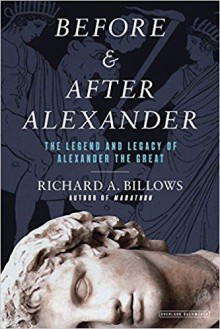
In this book, the classical scholar Richard Billows offers something different from the histories of the Alexander-centric historians who have preceded him. Rather than concentrating on Alexander, Billows expands his focus to encompass the pre-Alexander history of his homeland of Macedonia and the fate of his empire that followed. Though these subjects have been addressed by others, by bringing them together into a single book, Billows assesses Alexander's achievements from a different perspective — and the result is quite different from what might expect from previous books on the Macedonian conqueror.
The greatest consequence of Billows's approach is the highlighting of the achievements of Alexander's father, Philip. A great conqueror in his own right, while his reign has been overshadowed by his son, Billows makes clear how much of Alexander's success were due to his father's accomplishments. It was with Philip's army and Philip's commanders that Alexander waged his campaigns, which often used tactics that predated Alexander to win in battle. Yet Billows also notes that Philip himself was hardly an innovator, as he drew upon the experiences of decades of Greek wars in building his army into the Asian-conquering force of legend. This army was also the product of a region ripe for success, for as Billows details, its climate and geography gave it several natural advantages over the more tenuously-existing Green city states to the south.
From this perspective, Alexander's achievements were less as a creator than as an exploiter. This Billows underscores by emphasizing the unsustainable nature of his empire. As their abandonment so soon after Alexander's death makes clear, the Indian and Afghan territories comprising the easternmost edge of his conquests were simply too far off to be controlled from his resource base in Macedonia. While his plans for campaigns in North Africa and southern Europe may have been more realistic, they demonstrate that the essence of Alexander's achievements was conquest rather than construction. In this respect, his successors — the diadochi — deserve more credit for developing his legacy than Alexander himself merits, yet they too are often given only passing mention in most Alexander-centric considerations of the period.
All of this Billows lays out in an accessibly fluid text that makes for easy reading. He pulls no punches in his assessment of the "great" conqueror, and in doing so offers a valuable corrective to the overlarge reputation Alexander enjoys today. This is a book that anybody interested in a measured assessment of the legendary figure, one that details just how much of it rested on the shoulders of his predecessors and depended on the achievements of his successors.

 Log in with Facebook
Log in with Facebook 





